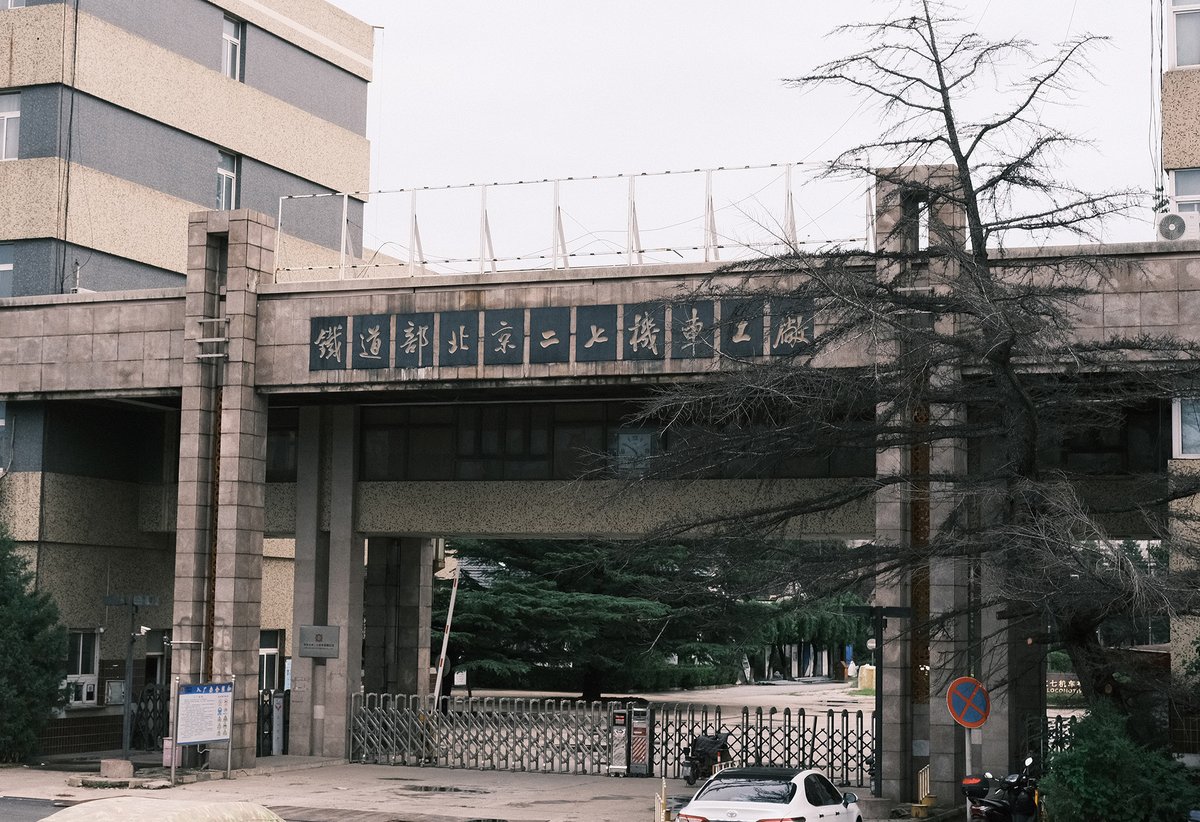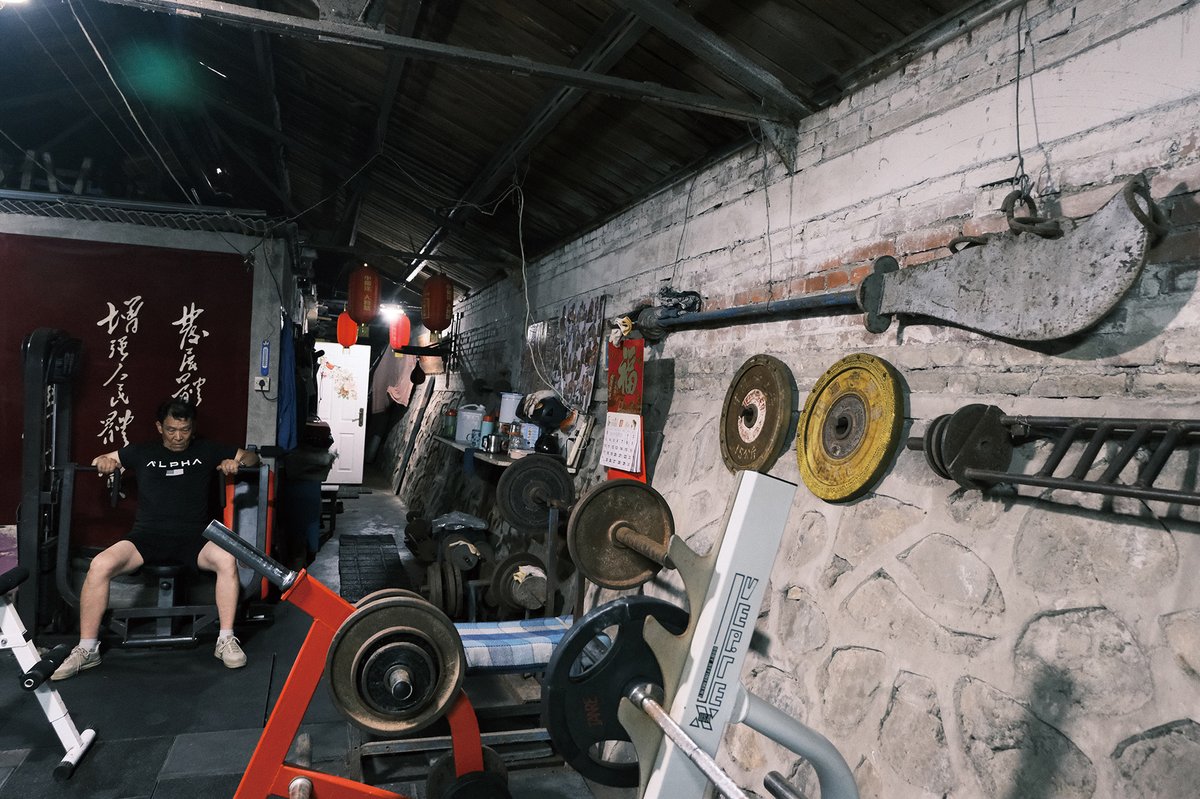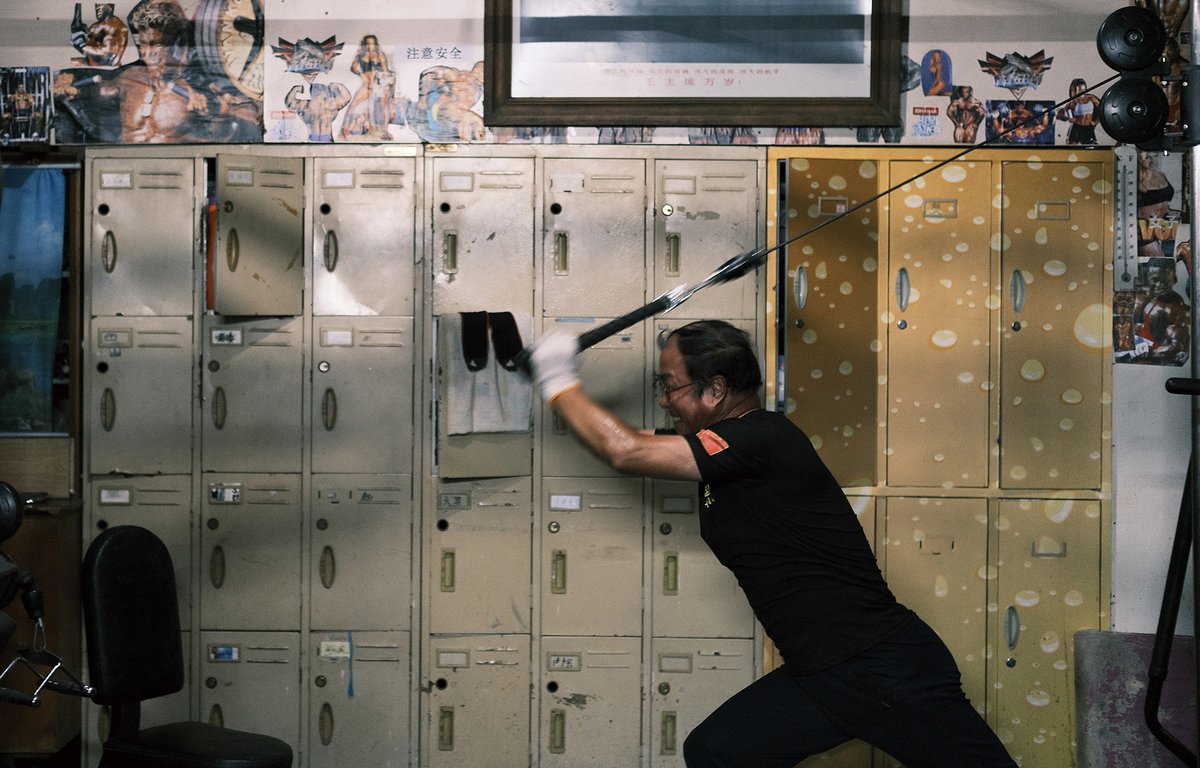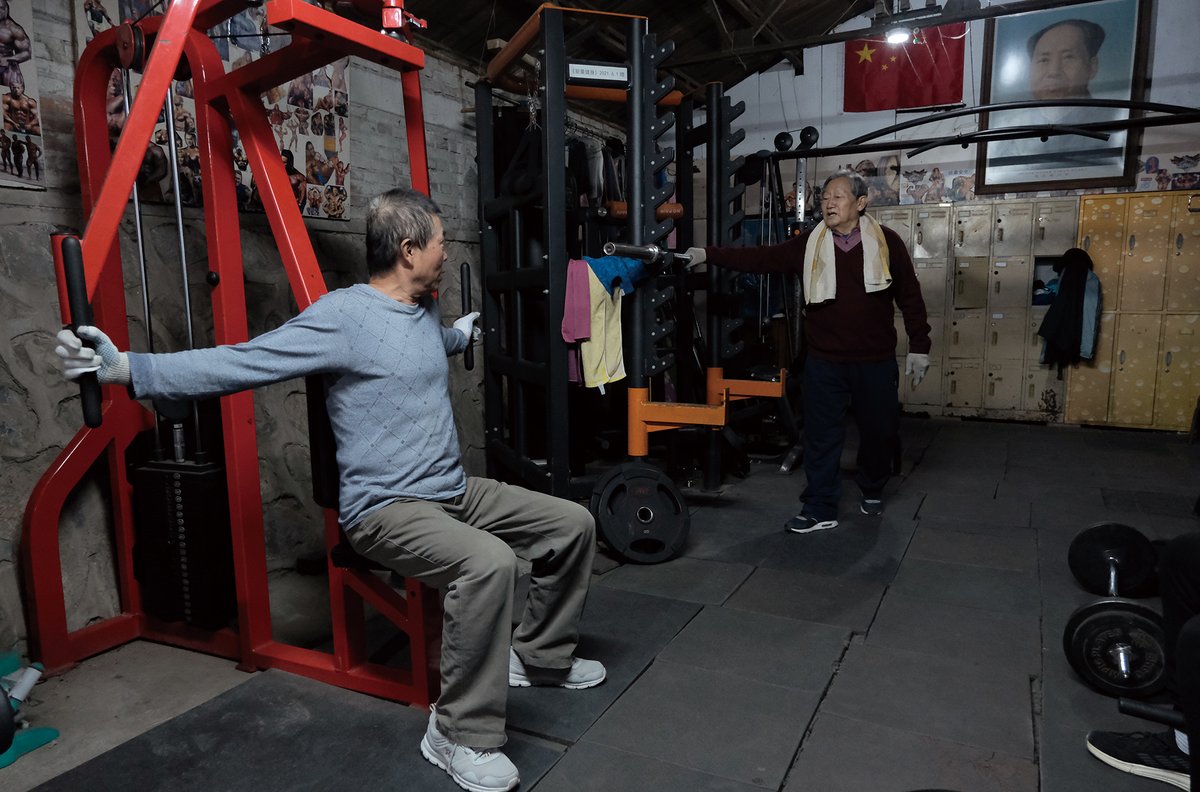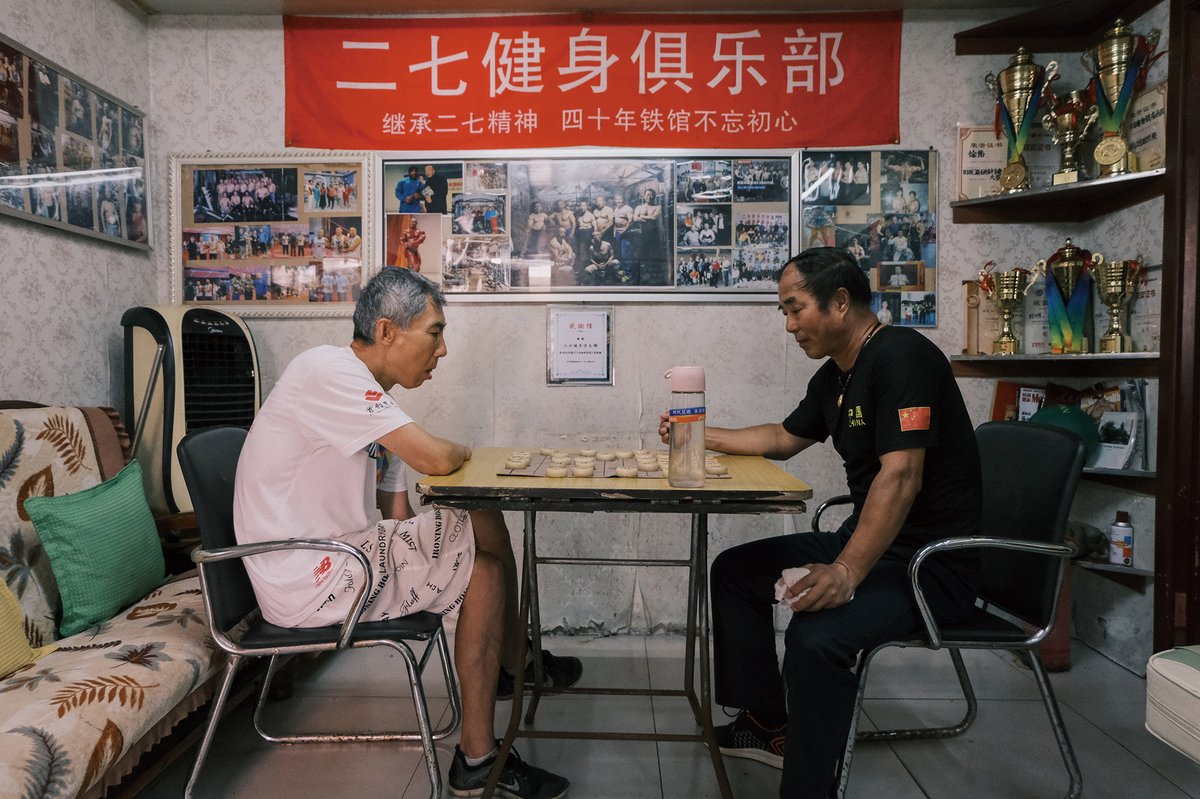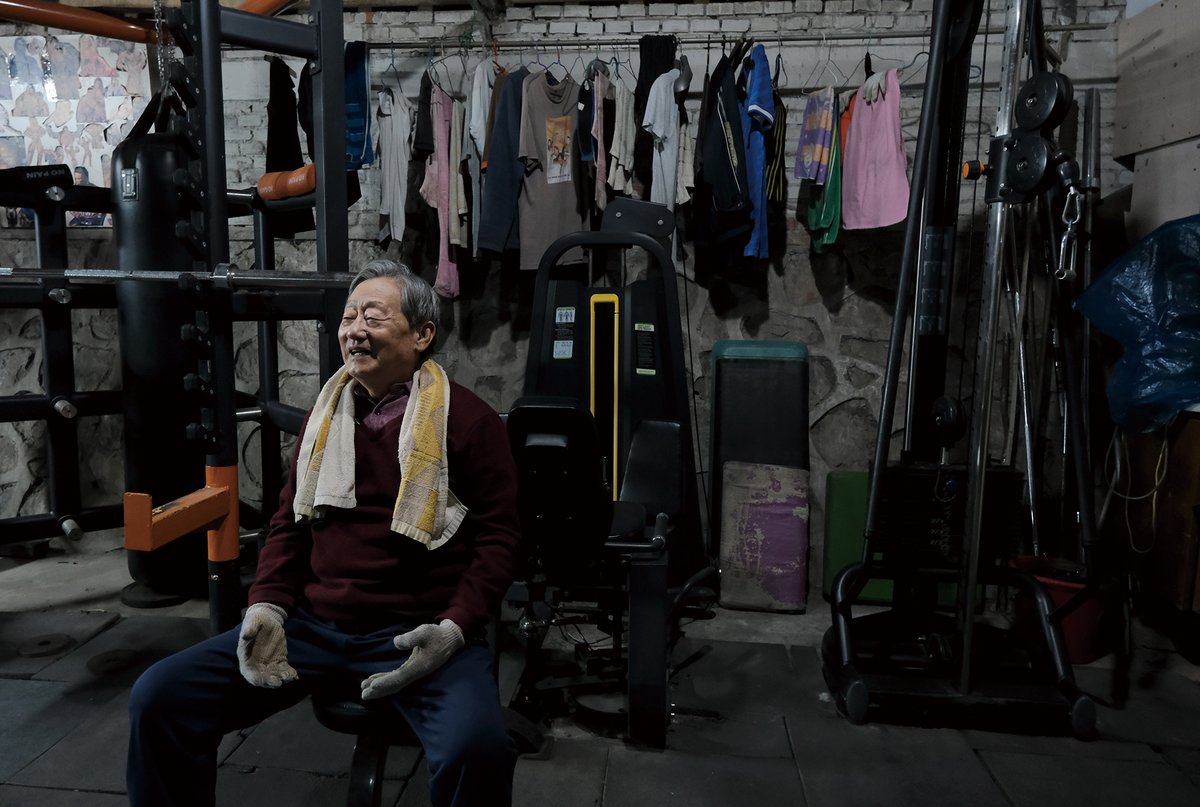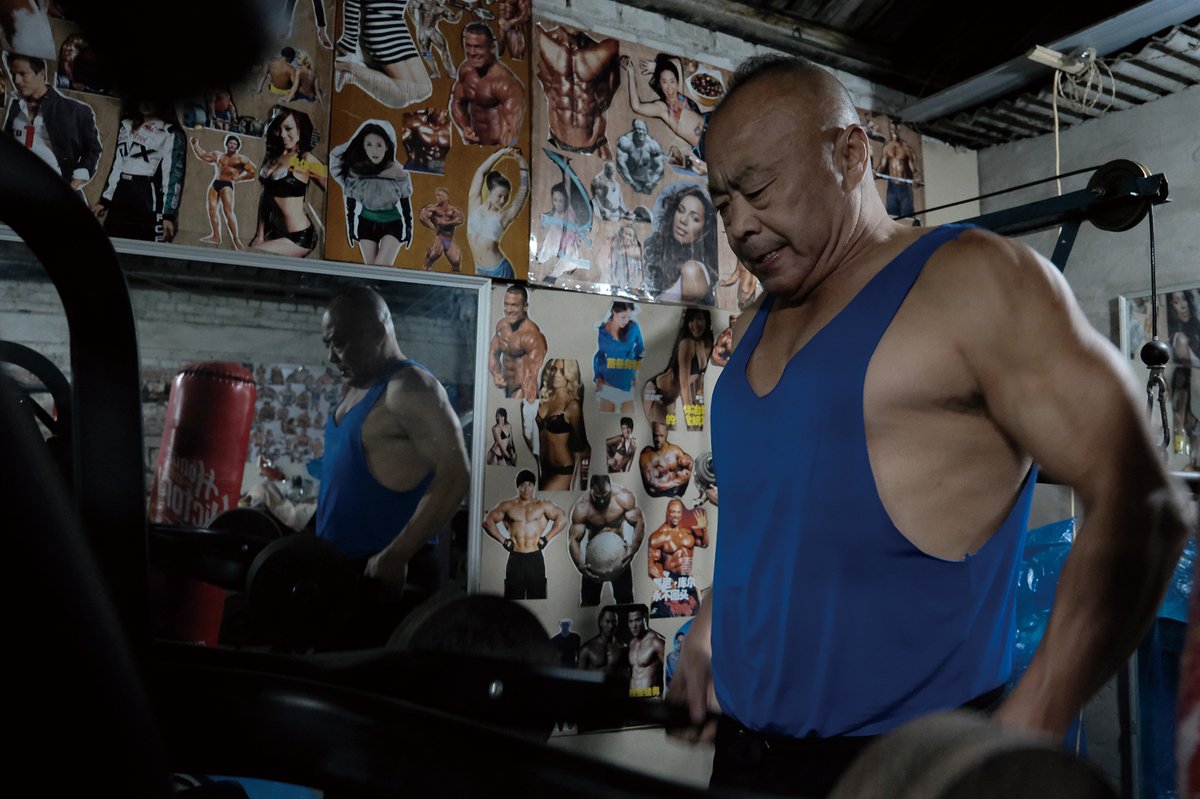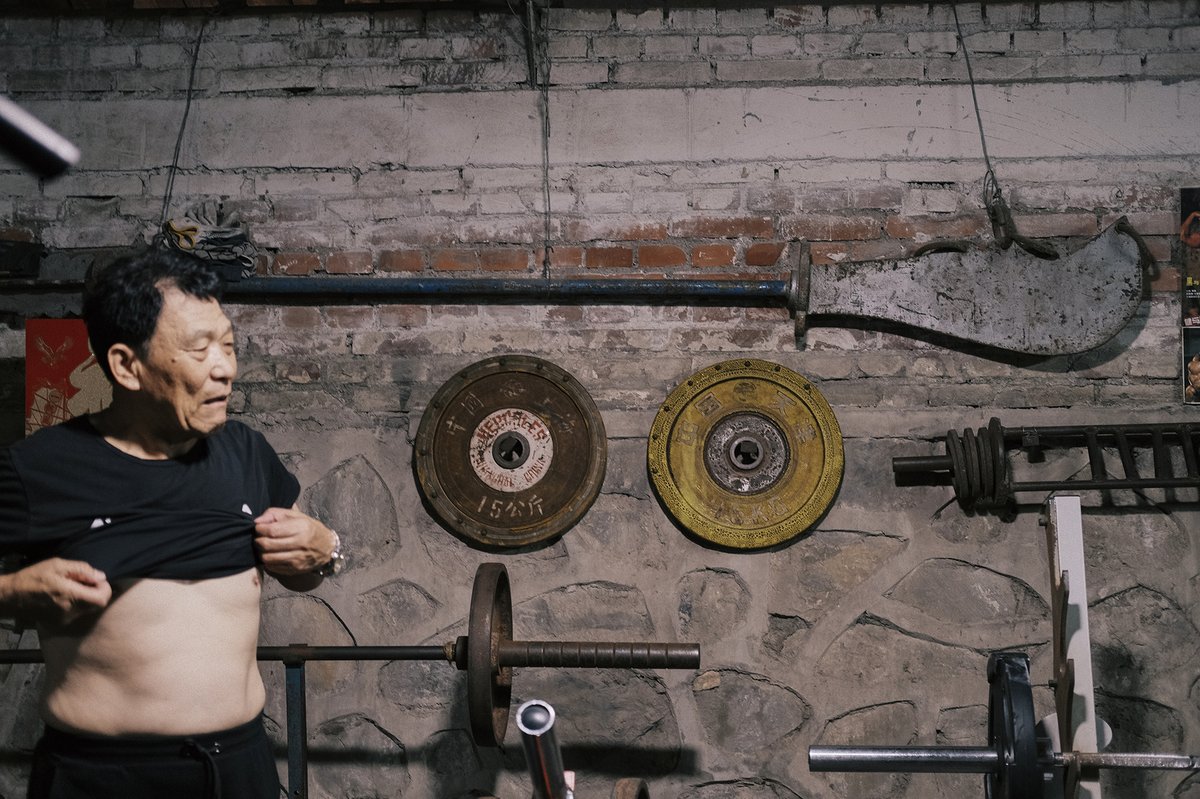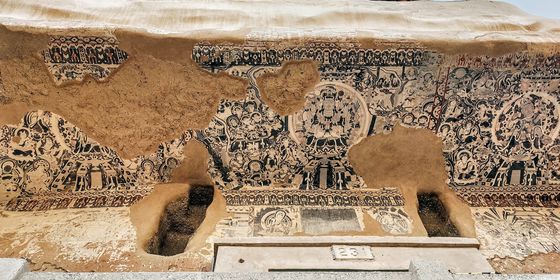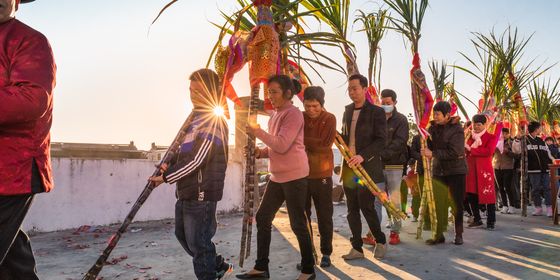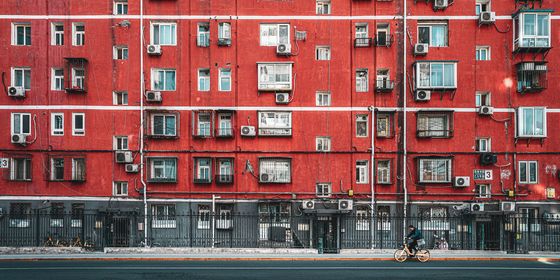On the outskirts of Beijing, a gym with homemade equipment offers a special community for retired factory workers
The Yongding River flows through the western suburbs of Beijing. Not far from the riverbanks, a cluster of single-story cottages is all that’s left of the Erqi Locomotive Factory, once the second-largest industrial hub in Beijing and famous for the Erqi Workers’ Movement of 1923, a strike that ended with the death of 33 workers’ representatives at the hands of the warlord Wu Peifu.
In a nearby residential community housing mostly retired workers and their families, a former bicycle shed without any signage or lettering sits sandwiched between two brick residential buildings. It is home to the Erqi Fitness Club, which Yang Hongzeng has been frequenting for 22 years. For at least five days a week, the 84-year-old Yang, who needs crutches to walk, shows up in the dim light and air thick with the scent of sweat, rust, and mildew. He greets each person one by one, before slowly taking off his jacket and putting on a pair of dirt-stained white work gloves to get ready for some exercise.
The majority of the gym’s 60 current members are former employees of the Erqi factory, which mostly produced locomotives and wagons. When the gym first opened in the late 1980s, these forgers, clampers, and electricians made its earliest fitness equipment from factory scraps. Most members here first met during the heyday of Chinese industry, then drifted apart when laid off from state factory jobs following the reform period, but eventually found their way back to this windowless shed—as exercise buddies and chess companions, trying to regain their physical glory while reminiscing about the past.
“Ask any child playing on the streets, they would tell you their parents worked at the Erqi factory,” Yang, who is the oldest member of the gym, says of the neighborhood in the old days. He joined the factory in the early 1960s and witnessed its transformation from a few workshops in a cornfield into a local economic powerhouse with over 10,000 employees.
Now, former workers like Yang come to the gym after lunch with thermos flasks filled with tea. The stronger ones, like the gym’s current owner Xu Wei, jump right into pushing up barbells on the flat bench, while those with slighter builds usually ease in with the lighter settings on the chest press machines.
In between sets, they fill the room with chatter about anything from the rising cost of eggs to speculations on what Communist Party officials eat at important national meetings. When the mood strikes, they set up a few games of Chinese chess in the lounge area, which is decorated with members’ photos, awards, and trophies from sports competitions.
For 300 yuan a year (but free for those over 80, students, and the unemployed), each of these mostly middle-aged and elderly exercise fanatics gets their own key to the gym and can work out and socialize here anytime—if they don’t mind freezing in the winter and suffocating in the summer without air conditioning, or the wooden roof that always leaks when it rains.
In 1988, Zhang Wei, the head sports coach for the national railroad system, founded the gym with about 20 fellow workers. Zhang’s job was to prepare workers to take part in inter-factory competitions, and many of the gym’s earliest patrons had trained and competed with him before. In 1956, Zhang won the first Beijing “Victory Cup” round-the-city running race, receiving a 45-kilogram halberd as a prize. The weapon has hung on the gym’s wall ever since, even through several relocations.
On May 12, 2014, Zhang passed away after a protracted illness. Xu and gym members attended the funeral on a rainy day.
“When Master Zhang was bedridden, he told me I had to take over the gym, and that he could only rest in peace if I succeeded,” Xu tells TWOC. Though he can’t lift the 45-kilogram halberd, Xu has carried the weight of this responsibility, presiding over the gym’s three relocations due to renovations and demolitions in the neighborhood.
By the 1980s, the Erqi Locomotive Factory was in decline. Around the country, state-owned industry was being dismantled and downsized. In later decades, Beijing’s commitment to regulate air pollution sounded the death knell for factories within city limits. Despite this, Xu, who was talented in soccer and wrestling, was hired in 1981 by the soccer-obsessed factory manager to play for Erqi full-time.
After a serious knee injury in 1985, Xu stopped playing soccer and took up fitness. He gathered clippings of muscular European and American men and women from newspapers and fitness magazines, which still adorn the gym’s walls today. Over the years, Xu has participated in four city-level bodybuilding competitions, with great success in the senior division.
In 1996, the factory issued a document encouraging workers to find other livelihoods. A few tech-savvy employees remained. Others were cast into the muck and sand to discover another way of living. In 2004, Xu accepted a payout to retire and officially left the state-owned factory.
Without higher education or many marketable skills, Xu had limited job options. “I was quite lost,” he confesses. “In the past, the working class was so powerful that we led everything in the factory. But the world outside the factory was very complicated.” For almost ten years, Xu lived off a modest pension while working as a security guard in parking lots and hotels.
Nowadays, many dispersed workers are drawn back to the gym, partly to keep healthy in spite of ailments from old age (ranging from spinal nerve problems to diabetes), but more for the shared memories of the past and the pleasant atmosphere.
Feng Jingchang—whose given name means “Beijing prosper”—began working out here only a year ago, but he had been an Erqi soccer teammate of Xu’s for many years. In 1990, the year he married, he forged dumbbells for the gym. Erqi’s soccer team was one of the top six teams in Beijing’s major league. “We trained nine months of the year. Every morning, the other workers would go to the workshop, but we’d go to the training ground,” Feng says.
In 1984, China’s journey to the final of the Asian Cup pushed the nation into a craze over soccer. In those days, Feng claims, “there was no one who didn’t play soccer.” To him, Changxindian, where the Erqi Locomotive Factory is located, was the football capital of the world. “I’ve known Ma Chengquan and Dai Yuguang since we were young children, and our families were neighbors,” he brags. Ma later became the chairman of the Chinese Super League in the 2010s and Dai one of the first referees from China to officiate at international level.
Erqi Locomotive Factory terminated Feng’s contract five years ago, with a severance payout of over 300,000 yuan. Initially, he spent his retirement taking care of his grandchildren and playing soccer. But in 2020, the sports fields in Changxindian were shut down because of the pandemic, and Feng was left with nothing to do but gaze at the locked gate of the fields on his way to picking up his grandchildren from school each day.
A call from Xu the next year broke the stagnation. “Old teammate, come work out with me!” Xu said.
Stepping into the gym, Feng feels as though he is transported back to the past. Fitness is not the only reason he comes every day—he also enjoys catching up with old colleagues. The stuffy shed is enlivened by his constant chatter in a thick Beijing accent: This former coworker moved to Shenzhen, that one missed the class reunion, someone else just had another grandson. On the morning of TWOC’s visit, he has just returned from hospital, and is recounting his conversation with the doctor while showing everyone the leukoderma on his hands.
“Look at my figure, I can’t train as hard as Xu Wei,” Feng says, “but working out, chatting about family—it’s better than playing mahjong and drinking every day.”
At 4 p.m., as the majority of the seniors depart one by one to pick up their grandchildren or finish their housework, 35-year-old Zhao Pengju parks his motorcycle by the door. From 4 to 6 every afternoon, while his son goes to after-school tutoring, Zhao works out in the Erqi gym.
When he is warmed up, he takes off his hoodie and continues to lift dumbbells topless, even in the October chill. Compared to the seniors, Zhao trains harder and takes time to check out his biceps in the mirror.
A latecomer to the gym, Zhao never worked or lived together with the other members, but he was drawn to the space when he came across Xu’s fitness videos on Douyin, China’s TikTok.
“It’s a good atmosphere to work out with these uncles,” he says. “In other gyms, people keep to themselves and look down on one another. But here the uncles teach me how to exercise.”
In 2019, with roughly 1,000 employees remaining, the Erqi Locomotive Factory terminated its last production line. It was the end of an era, but the former members of this once-glorious enterprise continue to care about the community even long after they left.
As for the future of the gym, Xu doesn’t have a clear idea. It had fewer than 20 members when he took over; now it has more than 60 regulars. He only looks up at the dripping ceiling and murmurs, “I have to find time to patch the roof.”
Several years ago, the monthly rent for the bike shed increased from 2,000 yuan to 5,000 yuan. As membership fees barely cover rent and utilities, there is no extra money for repairs. Xu is worried that the government will demolish the bike shed, which would mean yet another relocation.
But for himself, Xu has another goal. At 65, though he has contributed many trophies to the gym’s lounge area, he’s still not satisfied. “I will participate in the national [bodybuilding] competition next year,” he says. “And when I’m 75, I will do it again.”
Photography by Wang Jiawei







